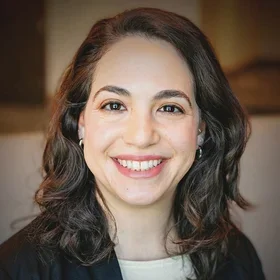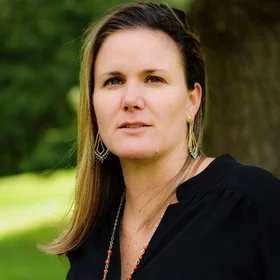Bridging the gaps between pediatrics, narrative medicine, and social justice, Dr. Jocelyn Brown (’23SPS, Narrative Medicine) professor of pediatrics at Columbia, partnered with her former professor Dr. Sayantani DasGupta to co-author an article, “Abolitionist Child Protection,” published in The Lancet. Confronting the deep-seated inequities in health care and child welfare, Dr. Brown and Dr. DasGupta examine the failures of the current child welfare system and reimagine a more supportive, community-centered approach to child protection.
“Ultimately, I think, we’ve got to ask ourselves what stories medicine is telling about health, what normative bodies and minds look like, and what society should look like,” explains Dr. DasGupta, who teaches and writes on “abolition medicine,” a framework that challenges conventional health care systems through anti-carceral and anti-racist lenses. “If those stories aren’t just, we’ve got to tell new ones that are.”
“With COVID, we learned that when we provide families with their basic needs—such as child tax credits—parents experience less stress and are less likely to abuse their children,” says Dr. Brown, who is the medical director of the Manhattan Child Advocacy Center in New York City. “The concept of abolitionist child protection allows us to reimagine a society where families receive what they need, and children can thrive in safer communities.”
In a recent interview with SPS, Dr. Brown and Dr. DasGupta shared how the Narrative Medicine program has enabled them to explore ways in which medicine can shift from surveillance to support by embracing anti-racist, justice-oriented approaches to child welfare and health care.
How did the two of you first connect?
Dr. DasGupta: Jocelyn and I met years ago during my fellowship in urban community health at Columbia. She was already an attending physician, and I was drawn to her dedication to child advocacy. Years later, when Jocelyn took my Abolition Medicine course, we connected again—but this time as student and teacher.
Dr. Brown: Sayantani’s class was transformative for me. I had long been aware of racial disparities in the child welfare system, but this course helped me understand them as part of a carceral system.
How do you define “abolitionist child protection,” and what prompted you to explore this concept?
Dr. DasGupta: Abolition, whether in child welfare or policing, isn’t just about tearing down existing systems. It’s about building up alternatives based on respect, care, and prevention. As we write in the article, abolition means investing in communities, not surveilling and policing them. This perspective challenges us as health care providers to ask whether the current child welfare system truly keeps children safe or if we need to imagine other models that do so.
Dr. Brown: Abolitionist child protection is about challenging and rethinking a system that often fails to keep families safe. Legal scholar Dorothy Roberts describes child welfare as a way to control marginalized families rather than protect them. Our article explores how the system’s punitive focus misses the chance to truly support children by meeting their basic needs.
What topics does the Abolition Medicine course cover?
Dr. DasGupta: The Abolition Medicine course is grounded in the idea that a socially just practice of medicine is a bioethical necessity. To move toward that goal, we start by examining medicine’s own histories of harm, from eugenics and racist experimentation to public health campaigns rooted in xenophobia. The first half of the semester dives into these histories of medical racism. The second half looks at anti-racist responses in medicine and grassroots movements, such as the Black Panther Party’s free clinics, environmental activism on the Standing Rock Sioux Reservation, and anti-racist AIDS and COVID advocacy.
Through these new perspectives, students rethink what health, illness, and healing could look like in a society committed to justice. I’m hoping to provide new ways of seeing medicine—not just as a field that treats individuals but as one shaped by historical, cultural, and social forces.
Dr. Brown: In Sayantani’s class, I began to see how poverty is too often misread as neglect and that a system of “abolitionist child protection” could work to support families’ needs rather than punish them.
What do you hope readers take away from your article in The Lancet?
Dr. DasGupta: I hope readers find that abolition medicine offers a vision of possibility and liberation. Health professionals can benefit from questioning the biases embedded in clinical practice and policy. Ruth Wilson Gilmore describes abolition as “building the future from the present in all the ways we can” and I hope readers come away asking what supportive, nonpunitive systems could look like for families in need.
Dr. Brown: I hope the article opens a conversation about cultural humility. As pediatricians, we need to understand the systemic barriers families face and work to advocate for the structures that support them rather than blaming individuals for circumstances they cannot control. Abolitionist child protection offers a path toward a child welfare system that keeps children truly safe by addressing root causes rather than symptoms.
About the Program
Columbia University’s Master of Science in Narrative Medicine prepares health professionals, writers, and scholars to apply the skills and values of narrative understanding to improve outcomes for both patients and caregivers. It offers a rigorous and in-depth study of close reading of creative texts, illness and disability narratives, narrative ethics, philosophy, creative writing, and other perspectives.


